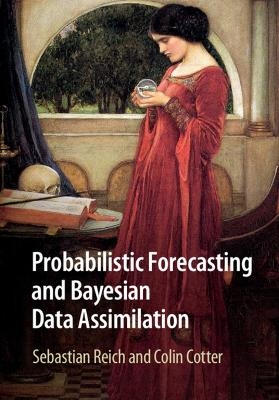
Probabilistic Forecasting and Bayesian Data Assimilation
Cambridge University Press (Verlag)
978-1-107-66391-6 (ISBN)
In this book the authors describe the principles and methods behind probabilistic forecasting and Bayesian data assimilation. Instead of focusing on particular application areas, the authors adopt a general dynamical systems approach, with a profusion of low-dimensional, discrete-time numerical examples designed to build intuition about the subject. Part I explains the mathematical framework of ensemble-based probabilistic forecasting and uncertainty quantification. Part II is devoted to Bayesian filtering algorithms, from classical data assimilation algorithms such as the Kalman filter, variational techniques, and sequential Monte Carlo methods, through to more recent developments such as the ensemble Kalman filter and ensemble transform filters. The McKean approach to sequential filtering in combination with coupling of measures serves as a unifying mathematical framework throughout Part II. Assuming only some basic familiarity with probability, this book is an ideal introduction for graduate students in applied mathematics, computer science, engineering, geoscience and other emerging application areas.
Sebastian Reich is Professor of Numerical Analysis at the University of Potsdam (full time) and the University of Reading (part time). He also holds an honorary visiting professorship at Imperial College London. Reich is the author of over 100 journal articles and the co-author of Simulating Hamiltonian Dynamics (Cambridge, 2005), which has received more than 600 citations. His research areas cover numerical analysis and scientific computing with applications to classical mechanics, molecular dynamics, geophysical fluid dynamics, and data assimilation. In 2003 he received the Germund Dahlquist Prize from the Society for Industrial and Applied Mathematics (SIAM) for his work on geometric integration methods. Colin Cotter has been a Senior Lecturer in the Department of Mathematics at Imperial College London since 2013. He has published more than 40 journal articles and three book chapters, on the design, analysis and implementation of numerical methods for numerical weather prediction, ocean forecasting and climate modelling; data assimilation; image registration; geometric mechanics and other topics in scientific computing and numerical analysis. His publications have been cited approximately 500 times. He is a key member of the Met Office/STFC/NERC-funded multi-institutional 'Gung-Ho' project which will design a next generation dynamical core for the UK weather prediction and climate forecasting system. He is also a co-investigator for the EPSRC Mathematics of Planet Earth Centre for Doctoral Training, and for the EPSRC Platform for Research in Simulation Methods (PRISM).
Preface; 1. Prologue: how to produce forecasts; Part I. Quantifying Uncertainty: 2. Introduction to probability; 3. Computational statistics; 4. Stochastic processes; 5. Bayesian inference; Part II. Bayesian Data Assimilation: 6. Basic data assimilation algorithms; 7. McKean approach to data assimilation; 8. Data assimilation for spatio-temporal processes; 9. Dealing with imperfect models; References; Index.
| Zusatzinfo | Worked examples or Exercises; 15 Halftones, unspecified; 7 Halftones, color; 55 Line drawings, unspecified |
|---|---|
| Verlagsort | Cambridge |
| Sprache | englisch |
| Maße | 170 x 244 mm |
| Gewicht | 610 g |
| Themenwelt | Geisteswissenschaften ► Sprach- / Literaturwissenschaft ► Sprachwissenschaft |
| Mathematik / Informatik ► Mathematik ► Analysis | |
| Mathematik / Informatik ► Mathematik ► Angewandte Mathematik | |
| Naturwissenschaften ► Physik / Astronomie ► Angewandte Physik | |
| ISBN-10 | 1-107-66391-1 / 1107663911 |
| ISBN-13 | 978-1-107-66391-6 / 9781107663916 |
| Zustand | Neuware |
| Haben Sie eine Frage zum Produkt? |
aus dem Bereich


